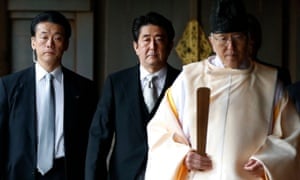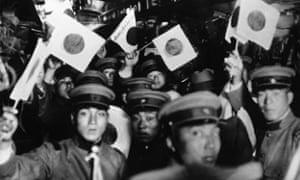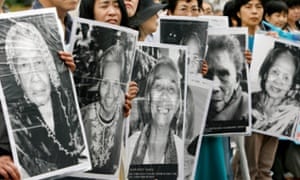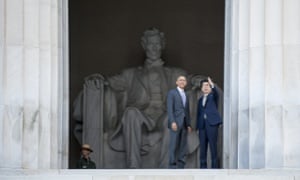The ghosts of Japan’s wartime past will set the tone for the remainder of Shinzo Abe’s weeklong visit to the US as he prepares on Wednesday to become the first Japanese prime minister to address a joint session of Congress .
Any references Abe makes to the second world war will be the best indication yet of how he intends to word a key statement he is due to give this summer to mark the 70th anniversary of the end of the Pacific war, amid present-day tensions with China and South Korea.
The first major announcement of his US visit went without a hitch on Monday when the allies unveiled significant changes to their joint defence guidelines. In return for a strong US commitment to Japan’s security, including taking Tokyo’s side in any conflict with China over the Senkaku/Diaoyu islands, Japan has become a more willing player in its bilateral security arrangements with the US.
But after Monday’s encouraging start, the focus has quickly shifted to Abe’s congressional speech – on the birthday of Japan’s wartime emperor, Hirohito – with pressure mounting for him to repeat previous official apologies for Japan’s wartime conduct in front of his US audience.

Until now, Abe has only gone so far in meeting the demands of critics, who accuse him of glossing over the worst of Japan’s wartime atrocities in an attempt to replace what he has called the “masochism” of postwar soul-searching.
In recent public comments, Abe appeared to fudge the issue. In a speech on Monday at the Harvard Kennedy School, he stopped short of repeating an apology made in 1995 by Japan’s then prime minister, Tomiichi Murayama, for the pain caused by Japan’s “war of aggression” on the Asian mainland.
“Japan has taken a path as a peace-loving nation based on its feelings of deep remorse over the last war for 70 years” since its surrender in the second world war, Abe said, adding, ”We will redouble our efforts to improve relations with China and South Korea.”
Abe has said he “upholds” the 1995 statement, which was repeated a decade later by the then prime minister, Junichiro Koizumi, but hinted recently that he may not include its “heartfelt apology” or recognise that Japan had waged a war of aggression in his summer statement on the 70th anniversary of its surrender.
His speech to Congress will be keenly watched in China and South Korea, where Abe’s December 2013 visit to Yasukuni, a controversial war shrine, reinforced fears about Japan’s apparent lack of contrition.
American critics too have now added their voices to calls for him to use his Congressional address to issue an explicit apology, and set in motion an era of regional detente to replace the tension and suspicion of the past few years.

Just before Abe flew to Washington, 25 House members, led by the California Democrat Mike Honda, wrote a letter to the Japanese ambassador to the US, urging Abe to “lay the foundation for healing and humble reconciliation by addressing the historical issues”.
There are signs that a tentative detente with Beijing is already under way. Last week, Abe held his second mini-summit with his Chinese counterpart, Xi Jinping, in six months, on the sidelines of an Asia-Africa conference in Jakarta.
But Abe’s insistence that Japanese military authorities did not coerce as many as 20,000 women, most of them from the Korean peninsula, into working in military brothels has so far ruled out a similar meeting with South Korea’s president, Park Geun-hye.
On Monday, Abe repeated his previous remarks on the “comfort women” issue that, for many South Koreans, does not go far enough. “My heart aches when I think about the people who were victimised by human trafficking and who were subject to immeasurable pain and suffering beyond description,” he said. “On this score, my feeling is no different from my predecessor prime ministers.”
More than two years into his term as leader, Abe has placed the US in an awkward position. The Obama administration has succeeded in securing a bigger Japanese commitment to defence cooperation, and backs plans to reinterpret Japan’s pacifist constitution.

But there is disquiet over the deterioration in Japan’s ties with its neighbours under Abe, including with US ally South Korea, and the extra acrimony that brings to longstanding disputes with Beijing and Seoul over island territories.
Evan Medeiros, senior director for Asian affairs at the National Security Council, hinted as much in a briefing in Washington this week. “We always stress that it’s important to address history questions in an honest, constructive and forthright manner that promotes healing, but also in a way that reaches a final resolution,” he said.
Abe, whose trip includes a meeting with Obama and visits to Arlington National Cemetery, may try to satisfy his US critics with mention of Japan’s mistreatment of American prisoners-of-war who died in the Bataan death march, according to Tobias Harris, a Japan analyst at Teneo Intelligence in Washington.
“Nevertheless, Abe may find it difficult to avoid the historical controversies with Japan’s neighbours while he is in Washington,” Harris said.
For all the progress, notably in trade and security, that Japan and the US have made on Abe’s watch, what should be his moment in the Capitol Hill limelight could fall flat unless he confronts Japan’s wartime legacy.




